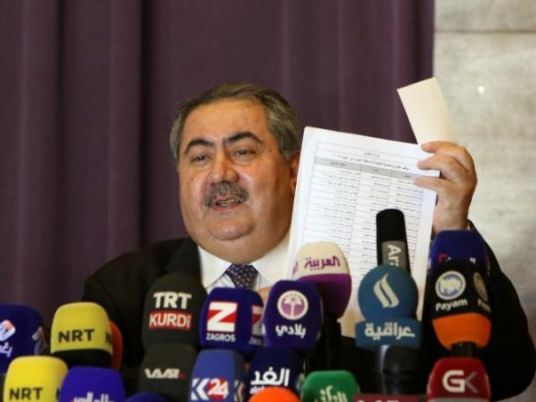
Deposed Iraqi Finance Minister Hoshiyar Zebari on Thursday accused former Prime Minister Nuri al-Maliki of orchestrating his removal from office, publicly exposing rifts within an increasingly unstable government.
Parliament dismissed Zebari, the top Kurdish official in the Baghdad government, on Wednesday after questioning him last month over alleged corruption and mishandling of public funds, which he denies.
Zebari, who served for more than a decade as Iraq's foreign minister including under Maliki, is a leader in the Kurdistan Democratic Party (KDP) and the uncle of the Kurdistan region's President Massoud Barzani. He has recently led negotiations with international lenders to improve Iraq's troubled public finances.
"The side that is behind the questioning and withdrawal of confidence is the State of Law and its head Nuri al-Maliki in collusion unfortunately with the speaker of parliament Saleem al-Jabouri," Zebari told reporters at a hotel in the Kurdish capital Erbil.
Maliki, who was replaced in 2014 by Prime Minister Haider al-Abadi after Islamic State seized a third of Iraq's territory, remains one of the country's most dominant figures and in a July television interview left open the possibility of a return to its top office.
Zebari, who called his questioning by parliament "vengeful, politicized and short-sighted", claimed the aim was ultimately to bring down Abadi.
"The target of these political interrogations is not specific ministers. The goal is to reach the head of executive authority, bring down the government and confuse the political situation, to bring the temple down on those inside because of very clear grudges, malice and hatred," Zebari said.
Maliki does not hold a seat in parliament but leads the Dawa Party, of which Abadi is a member. Dawa is the leading faction in the dominant State of Law coalition.
A Maliki spokesman denied the allegations, saying many lawmakers from outside Dawa had voted to sack Zebari: "Mr Maliki did not support the questioning but he gave the members of his State of Law bloc the liberty to practice their constitutional right of oversight."
A spokesman for speaker Jabouri said: "This is what Zebari thinks and we respect what he thinks. Dr Jabouri thinks Zebari deserves a better situation than this but at the end it is parliament's call, not the speaker's."
In a press conference that lasted over an hour, Zebari defended himself, criticized parliament's use of a secret ballot in the no-confidence vote that toppled him, and said he was appealing to the constitutional court.
He warned the row could hurt Erbil's relationship with Baghdad, which has been strained most recently by a dispute over oil revenues.
There will be a pause and a review of this partnership and participation. Not that we will not support this government … but without a doubt we will review the source of the issue," he said. "It is an attempt to topple and obstruct and exclude a principal party and a fundamental partner in the political process."
Zebari said thought had not yet been given to a successor. Ministerial posts in Iraq are distributed along ethnic, sectarian and party lines in keeping with a quota-based system set up after the U.S.-led invasion in 2003 that toppled Saddam Hussein.




